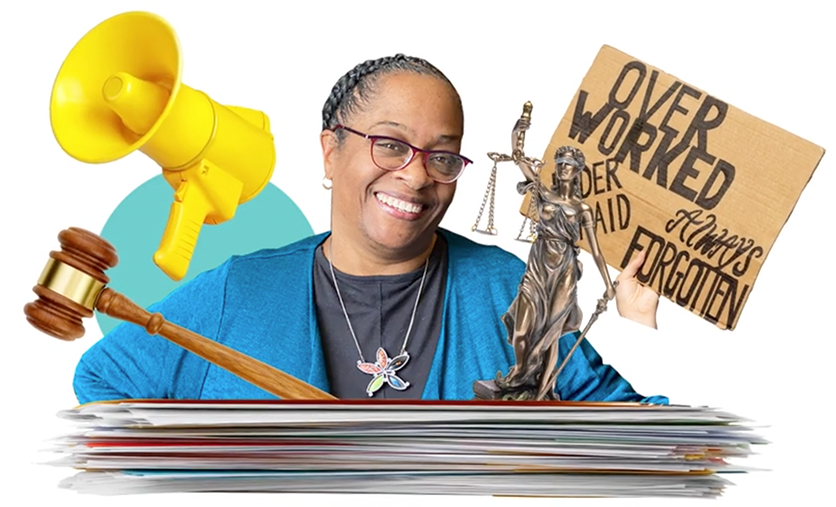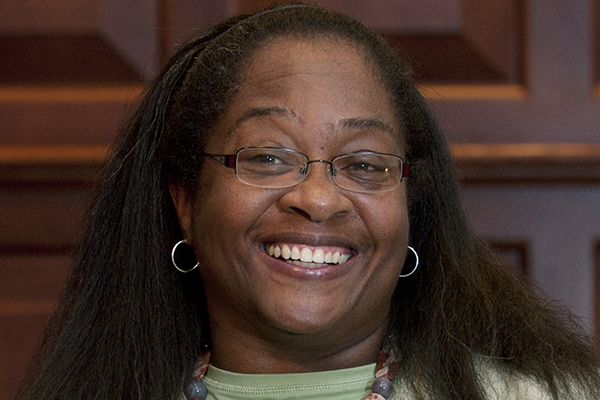One of the biggest influences in Peggie Smith’s life and career was, and is, her first-grade teacher in Manning, S.C.
Ethel Richburg taught elementary students for 45 years, and her commitment to teaching inspired Smith when she had to decide whether to pursue a career practicing law or molding future generations.

Peggie Smith is a champion for strengthening the rights and legal protections of domestic workers, particularly Black women. READ MORE about some remarkable WashU Women who, every day, are expanding boundaries and showing up. (Graphic: Monica Duwel/Washington University)
“As a teacher, Ms. Richburg opened my eyes at an early age, opened my eyes to the real transformative value that one can have as an educator,” Smith recalls. “I thought about how she used her position as an educator to have this unbelievable impact on the lives of her students. That cemented my choice, and I’ve had no regrets.”
Smith, the Charles F. Nagel Professor of Employment and Labor Law at Washington University in St. Louis, has worked throughout her career to champion the rights of others, whether that’s legal protections for domestic workers or students from backgrounds underrepresented in the legal field.
Much of her research has focused on rights and legal protections for domestic workers, those with jobs such as home health aides, in-home child care providers, or housekeepers. Because they often toil on their own in people’s homes, there is no oversight or labor union to ensure safe working conditions and fair hours and wages, Smith says.
Over a decade ago, the International Labour Organization, a U.N. agency, established international standards to improve working conditions for tens of millions of domestic workers worldwide, calling for measures such as overtime pay, a minimum wage and safety provisions, to name a few. But, as Smith notes, even the United States has been slow to embrace such protections, and has left these workers vulnerable to a host of exploitive labor practices.
Still, she says, progress has been made in that time. Some states have enacted state-level workplace protections for such laborers, and President Joe Biden’s proposed Build Back Better legislation includes improved Medicaid funding for home care services for the elderly and disabled, as well as improved benefits for low-wage home care workers.
“Home care is essential,” Smith says. “It’s a vital source of employment for many women and it’s also indispensable both for individuals who need care, as well as for their families who are able to work in jobs outside of the home while knowing that their loved ones are being cared for.”
Beyond her research on domestic work, Smith champions opportunities for women and minorities within the legal profession.
Her role as a Black woman teaching law has helped her to have a positive impact on the legal field by supporting and mentoring law students as well as other women of color who aspire to enter legal academia. She notes that diversity in both gender and race has notably increased during her career, but there is still a long way to go.
Today, law school classes nationwide are composed of slightly more women than men, she says, and many women law school graduates enter into law firm practice. Yet the share of women who are equity partners at firms continues to lag behind, at less than 25%. The COVID-19 pandemic has exacerbated this problem. As many working parents have had to juggle careers and caregiving in more challenging ways than typical, women have taken on an even heavier load compared to their male counterparts.
‘We still live in a society where the majority of care work falls disproportionately on women,” Smith says. “And that requires law firms to adapt what they’re doing, to ensure that women can continue to pursue their legal careers while also balancing family obligations.”
Part of the way Smith works to help is simply by being a visible presence and a resource to those who have questions, whether they are curious about legal careers overall or an academic position.
Bringing her unique experience into her classes is an important aspect, she says. “All professors enter the classroom with a certain perspective, a certain background. Because of my own background, I am especially mindful of ways that I can integrate issues of race and gender into class discussions when appropriate.”
Smith also highlights the importance of having successful Black women occupying the role of tenured law professors at top institutions.
“Our very existence as professors in institutions traditionally dominated by white men serves as a very powerful role model for students who never thought they could see themselves in these roles,” she says.


Comments and respectful dialogue are encouraged, but content will be moderated. Please, no personal attacks, obscenity or profanity, selling of commercial products, or endorsements of political candidates or positions. We reserve the right to remove any inappropriate comments. We also cannot address individual medical concerns or provide medical advice in this forum.